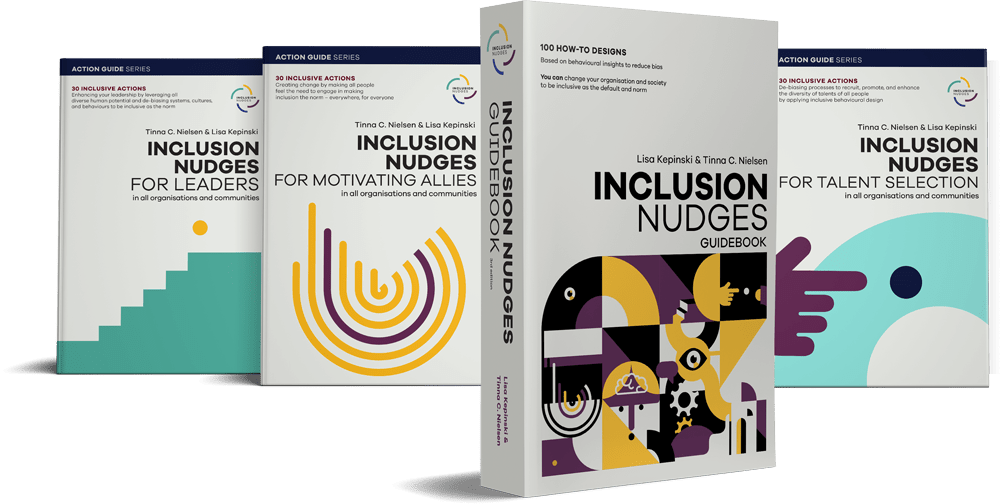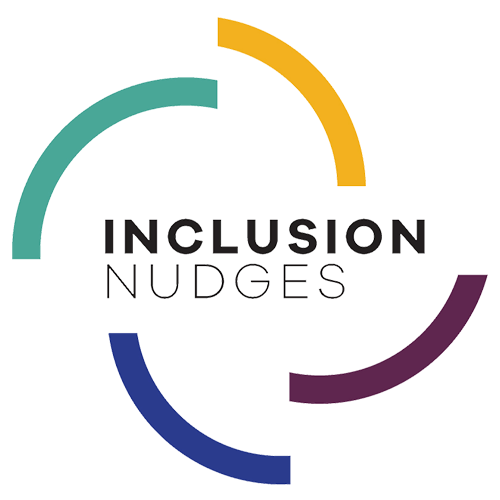Authors & Founders
We, Tinna C. Nielsen and Lisa Kepinski, are the Founders of the Inclusion Nudges global nonprofit initiative.
We developed the change approach that we call Inclusion Nudges. It is based on our backgrounds in behavioural and social sciences and our deep experience as organizational transformation leaders and diversity, equity, and inclusion experts.
This is our story, and we want to share it with you.
A person & professional drive
For as long as we can remember, we have both one way or another been engaged in making changes, small and big. Our work is centred on creating equitable, diverse, and inclusive communities, organisations, systems, families, policies, cities, and societies. We have both felt like outliers from time to time and have turned this into a drive for making impactful changes. We both come from working-class backgrounds and were the first in our families to attend university. We both feel blessed to have had opportunities to travel and meet people from other cultures and have our own perspectives broadened. We have many similarities, but also completely different backgrounds, upbringings, and lives today.
What triggered the Inclusion Nudge initiative
It’s amazing serendipity that our life paths crossed in 2013. At that time, Lisa, an American, was working for a multinational financial organisation in Paris and was commuting weekly to her family and home in Germany. Tinna, a Dane, was settled in Denmark after many years of living and travelling abroad and was working in a global food company in Denmark. We were introduced to each other through a mutual contact, who said: “You both apply behavioural insights and experiment in ways that I have not seen others do in the work of diversity and inclusion, and I think you should know each other.” As leaders with global responsibility for inclusion and diversity, we had both been working this way on our own for several years because it was how we could succeed. We both experienced the struggle of ‘being shot’ as the messengers and change makers, having people say the right things but not change behaviour, seeing increased leader support while having backlash within the culture, and so much more. With our foundations in social sciences, we were applying behavioural designs to empower and nudge people to be more inclusive. We experimented as undercover change agents. It worked for us and for the organisations in which we worked.
Our first online meeting was scheduled for an hour. But the conversation went on for several hours as we discovered so much common ground. We shared our thoughts about the needs that we both saw for breakthrough change in how inclusion, equity, and diversity were being practiced. With the energy we got from our discussion, we decided to merge our approaches and frame up the concept of Inclusion Nudges in ways that could enable and empower others to also apply it. And so began our journey together. In addition to setting up together the Inclusion Nudges global initiative, we each founded our own change organisations. We want to empower change makers, leaders, practitioners, and social activists because none of us should exhaust ourselves by the burden of having to ‘fix it’ (‘it’ = discrimination, harassment, inequality, diversity, inclusion). We should join forces in getting as many people as possible engaged in creating sustainable changes for inclusive cultures and systems.
Growing a global movement
We have spent thousands of hours working together exchanging ideas, designs, frustrations, joys, and hope. This has resulted in the Inclusion Nudges approach being internationally recognised as game changing. We have given many keynote talks, offered learning sessions, coached leaders, and (as of 2020) written 6 books and many articles. We have heard from people how this has transformed how they work as change makers. Our work with the Inclusion Nudges change approach has led to impactful changes in collaboration with organisations, such as the United Nations, the International Red Cross & Red Crescent Movement, the World Economic Forum, Amnesty International, the OECD, the Danish Film Institute, and many multinational corporations, small and medium-sized businesses, universities, hospitals, governmental agencies, individual change makers, and more. Businesses, humanitarian organisations, social innovators, refugees, leaders, and many others around the world are applying Inclusion Nudges to make it easier to make changes. We couldn’t be prouder. For this work, we were named to The Economist’s Global Diversity “Top 10” List in 2015, 2016, & 2017. With humility we continue to build a global movement that can fundamentally change how we achieve diversity, equity, belonging, and inclusion faster and make it stick. We really hope you will join us. Together, by applying Inclusion Nudges we can make inclusion the norm—everywhere, for everyone.
You can learn more in The Inclusion Nudges Guidebook, the Inclusion Nudges Action Guide Series, and the Inclusion Nudges blog, as well as several articles on the World Economic Forum’s Agenda blog where we also publish.

Tinna C. Nielsen
Co-Founder, Inclusion Nudges
Co-Author the Inclusion Nudges Guidebook & Inclusion Nudges Action Guide Series
Equitable Transformation Lead for Social & Human Sustainability, EQT
Tinna is a world-acclaimed specialist in applying insights from behavioural and social sciences to design impactful solutions and change behaviours. Her unique strength and approach are listening to the voices of people and empowering people of all walks of life to make changes and social innovation in their sphere of influence. Tinna is an anthropologist, social entrepreneur, and behavioural designer passionately pioneering innovative approaches to accelerate inclusiveness, diversity, equality, and gender parity as a means to achieve innovation, development, and the Global Goals (SDGs)
In 2015, The World Economic Forum selected Tinna as a Young Global Leader to take an active part in creating solutions to improve the state of the world. At the same time Tinna was asked by the United Nations to become strategic partner for inclusiveness and gender parity and has influenced several UN projects since 2015. She served as co-chair of the Global Future Council on Behavioural Science at the World Economic Forum 2016-18, and is part of the Expert Network, as well as a writer for their blog Agenda. As a fellow at the RSA, Royal Society of Arts, Tinna also serves on several advisory boards.
Tinna has worked for the Danish Institute for Human Rights, and as the Global Head of Inclusion, Diversity, and Collaboration in Arla, a multinational food corporation (2010-15). The same year she co-founded Inclusion Nudges, she founded the change organisation Move the Elephant for Inclusiveness. Today, she is the Equitable Transformation Lead for Social & Human Sustainability at EQT (a global investment firm) where she is globally responsible for DEI, human rights, health, and well-being internally in the firm and in the portfolio companies.
She has extensive experience in organizational leadership development and cultural change at all levels and in all functions. And she can describe a complex change process as drawings. Tinna is an internationally recognised speaker and influencer. In her TEDx talk, she shares how we can all Nudge Behaviour for a More Inclusive World. In addition to the Inclusion Nudges Guidebook and the Action Guide Series, Tinna has co-authored books on how to apply behavioural insights to improve the social welfare system, as well as a book on inclusive community co-creation.
Growing up in the 1970s in a working-class family, with loving parents and an older brother, Tinna experienced gender equality first-hand when her mother broke out of limiting traditions and joined the women’s movement. This combined with experiencing the implications of her brother’s severe dyslexia in a school system that believed he was unable to learn other languages, proven wrong by a teacher who helped him pass the English exam in less than a year, sparked a belief in Tinna at an early age, that every person has potential that can and should be leveraged – also when it’s against all odds. Tinna has throughout her teenage and young adult years felt like an outlier herself being 185 cm (6.2 inches) tall and not fitting the unspoken and unwritten norms of women having to be shorter than men. The feeling of shame was replaced with pride when she started playing basketball, which led to playing for the Danish National Team and among the 16 best college teams in the U.S. Tinna has worked since she was 13 years old (in factories, hospitals, kindergarten, and as a carer for people with disability), and she was the first on both her mother’s and father’s side to graduate from university (Master in Anthropology). Social mobility came from growing up in a country built on solidarity with equal and free access to education for all citizens. Growing up, experiencing the potential of equality, the barriers of excluding norms, and later experiencing the joy of diverse cultures when travelling the world, Tinna found her dedication and profession of making diversity, equity, and inclusion the norm. Today, Tinna is living in Denmark with her husband Troels and their three daughters Rosa, Freja, and Sigrid.

Lisa Kepinski
Co-Founder, Inclusion Nudges
Co-Author the Inclusion Nudges Guidebook & Inclusion Nudges Action Guide Series
Founder, Inclusion Institute
lisa.kepinski@inclusion-institute.com
As an organisational and behavioural change thought leader, Lisa frequently speaks at conferences, designs and delivers learning sessions, coaches leaders, advises organisations, conducts research, and writes. Her clients are multinationals, businesses, NGOs, governments, universities, and change makers. She is a strategic partner to the United Nations for equity and inclusion. In June 2017, Lisa gave a TEDx talk on the need to design for inclusive behavioural change in talent selections. The focus of her work is to help further the profession of inclusion, equity, and diversity with new insights and practices and also to empower people to be effective change leaders for inclusion. She does this always with a practical application focus.
This pragmatic perspective is based on her 20 years’ experience as a global inclusion, equity, & diversity executive for AXA, Microsoft, & HP. Lisa knows well the realities of creating change inside large, global organisations. In 2013, she founded the Inclusion Institute and focuses on designing organisational and behavioural change strategy and actions. Her practice is based on collaborative partnership with clients on how to successfully achieve their goals within an inclusive culture for sustainable and equitable growth. She also coaches change makers and leaders to enable them to carry the work forward in their own organisations. Lisa works with groups to focus on inclusion, such as by serving on several advisory boards, chairing conferences, founding the Europe-based Global D&I Forum, and as an expert panellist for the Global Diversity, Equity & Inclusion Benchmarks.
In addition to the Inclusion Nudges Guidebook and the Inclusion Nudges Action Guide Series, Lisa has co-authored three global research studies. Her 2016 research report “A Fresh Look at Women Networks” offers insights and advice on increasing the effectiveness of women networks. In 2017, she wrote a report for Newsweek on impactful inclusion and diversity actions. Lisa’s research in 2019 examined ways to have an inclusive ‘remote’ working experience, offering insights and designs to increase connection and belonging across location-distributed teams.
Lisa grew up in a lower middle-class, military, conservative family in the U.S. Her family came from many generations of Southern poor, farming, and working-class white people who immigrated in the 1700’s from England and Ireland. Her maternal grandmother’s mother was Cherokee Native American, but unfortunately this culture was not passed through the family. Social mobility came from Lisa and her family having white privilege within a deeply racist, sexist, discriminatory, and violent culture. Her grandmother’s gentle spirits are with Lisa as she cooks the food of her past—representing the complex legacy of the many people of her hometown of Charleston, South Carolina, including enslaved Black people, slave owners, farmers, poor people, Native American people, and immigrants.
Despite being told repeatedly that she had two career options (to be a nurse or a teacher), Lisa went a different path. She was the first on her mother’s side to graduate from university and with two degrees. Her studies in social psychology focused on human behaviour and in socio-linguistics she had two specialisations—one on gender and language and another on immigrant cultural assimilation and language. Growing up, having seen and felt racism, sexism, classism, and other forms of oppression, including abuse, Lisa felt the need to find a way to address inequalities, and through her work, she tries to do this. Central to this is examining her past to see how the power of privilege and oppression are a part of who she is. With reflection and questioning, Lisa approaches her work as a change maker.
Lisa is a world citizen. She lived in many states in the U.S. and in 5 countries. She has travelled extensively in her global work. For the past 20 years, Lisa has lived in Europe, and now is settled in a small German Alpine village. With this backdrop, Lisa and her husband, Pawel, raised their two daughters, Anya and Camila.
Inclusion Nudges
Inclusion Nudges is a change approach developed in 2013 by Lisa Kepinski and Tinna C. Nielsen based on our extensive experience as global change makers for inclusion combined with our background in behavioural sciences.

